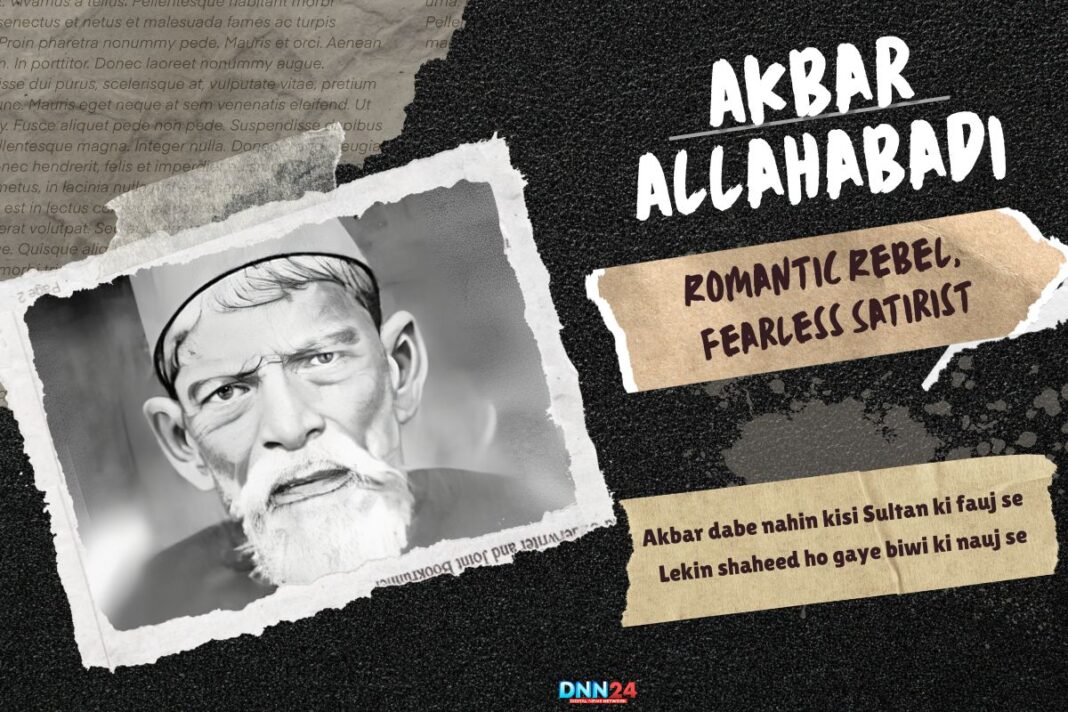In the center of Bara, Allahabad, a child appeared in 1846 who would be known as the “Lisan-ul-Asr,” the Voice of the Age. Akbar Allahabadi, whose real name was Syed Akbar Hussain Rizvi, came from a family of Sayyads, tracing their roots to Persian soldiers who settled in India. Moulvi Tafazzul Hussain, his father, was a Naib Tehsildar, and his mother had connections to the Zamindar family in Bihar. Before enrolling in the Jamuna Mission School for English in 1856, Akbar learned Arabic, Persian, and Mathematics at home.
His time with conventional textbooks was brief—he gave up school in 1859, even though he would never lose his desire to learn. Before he was an emperor, Akbar was both active-minded and easily moved by poetry. Like many of us, Gulzar often got lost in his memories while visiting Allahabad, writing poetry in the empty sections of his father’s texts.
duniya mein hun duniya ka talabgar nahin hun
Akbar Allahabadi
bazar se guzra hun KHaridar nahin hun
zinda hun magar zist ki lazzat nahin baqi
har-chand ki hun hosh mein hushyar nahin hun
Even years after writing this diary, he still seemed separated from everyday life. The experience of life for him went beyond learning; it included noticing the kids laughing and the elders just being silent while he watched the city go from one color to another. When he was young, Akbar had poet’s awareness of life’s twists and its feelings which inspired the poetry he wrote.
The Early Part of Akbar’s Career
Akbar’s journey was always full of hardships. After finishing school, he began as a clerk in the Railway Engineering Department. Working harder than his resources, Akbar never left his writing tools behind. He studied law in the quiet hours, eventually qualifying as a vakeel (barrister). From being a railway clerk to becoming a sessions judge, he showed great courage and style. By recognizing his efforts, the colonial government made him “Khan Bahadur.”
Ghamza nahin hota ki ishaara nahin hota
Akbar Allahabadi
aankh un se jo milti hai to kya kya nahin hota
jalwa na ho mani ka to surat ka asar kya
bulbul gul-e-taswir ka shaida nahin hota
Still, Akbar surprised people with his changeable personality. Even though he valued discipline in the British, he strongly disagreed with what they called their civilizing mission. His son was sent overseas to study, yet Callister often described in his poems the hazards of trying to follow trends from the West. He gained respect from friends in court for his wisdom, and his humor was what everyone treasured from him in daily life.
paida hua wakil to shaitan ne kaha
Akbar Allahabadi
lo aaj hum bhi sahib-e-aulad ho gae
His humor made him feel safe and able to challenge others. He used it to understand society’s mistakes, point them out, and even laugh at himself sometimes.
Shayari from Akbar’s Poet: How His Poems Enchanted
Akbar Allahabadi’s poetry is like a river—sometimes gentle, sometimes fierce, always flowing with emotion and insight. Mushaiyir wrote ghazals, nazms, and Shayari that moved every heart. Whatever he said was quite simple, but his messages were meaningful. He could entertain you with a witty rhyme and then break your heart with his storey from the following stanza.
hum aah bhi karte hain to ho jate hain badnam
Akbar Allahabadi
wo qatl bhi karte hain to charcha nahin hota
He touched on topics like love, loss, the way we live, and spirituality. His poems about love were particularly touching, mixing romance with a true sense of what love is like.
Ishq naazuk-mizaj hai behad
Akbar Allahabadi
Aql ka bojh utha nahi sakta…
Both the words and the meaning of Akbar’s poetry reflected his real-life experiences. He thought that the world was like a stage and each human acted out a role. He used humor not to hurt people; instead, it helped us see how we’re all alike.
Kissey : The Unknown Accounts of the Emperor Akbar
Beneath his titles of expert judge and clever poet, Akbar’s stories include many details that show him as a different man. A story from that era comes from when Aesop was a clerk. At one time, an English commander joked about my Urdu accent, saying that Indians would never be good at English. Akbar looked up at me with a moment of laughter, saying in English, “Sir, it’s a heart issue, not a tongue issue.” Akbar’s colleagues burst into laughter as he kept the officer from saying anything.
Hum kya kahen ahbaab kya kaar-e-numayaan kar gaye
Akbar Allahabadi
B.A. hue, naukar hue, pension mili, phir mar gaye
Another kisso is dedicated to his love for mangoes. The story says that in summer, he would gather friends for a mango mushaira, having each person give a basket of mangoes as the entry fee. Akbar would pause between meals to say:
Nama na koi yaar ka paighaam bhejiye
Akbar Allahabadi
Is fasl mein jo bhejiye, bas aam bhejiye
Aisa zaroor ho ke unhein rakh ke kha sakun
Pukhta agarche bees, to das khaam bhejiye
Maloom hi hai aap ko bande ka address
Seedhe Allahabad mere naam bhejiye
Aisa na ho ke aap yeh likhein jawaab mein
“Tamam hogi pehle”, magar daam bhejiye
The poet, thinkers, and travelers were always made welcome in his home. He thought that poetry was something you could feel as well as write.
Loving Quotes About Akbar
Akbar Allahabadi’s shayari on love is a garden of emotions—sometimes fragrant with hope, sometimes heavy with longing. He treated the beloved with an equal measure of respect and humor.
Haya se sar jhuka lena, ada se muskara dena
Akbar Allahabadi
Haseenon ko bhi kitna sahl hai bijli gira dena
His poems, nazms, and ghazals describe what love feels like—being with someone, being apart, and wanting someone. Akbar’s amorous side never tended towards exaggeration. It was gentle, fun, and very human. He believed love was more like a gentle rain for our souls than a strong storm.
Akbar’s Nazm Is a Romantic Account of a Detailed Journey
Akbar Allahabadi’s nazm are jewels of Urdu poetry. Every nazm is a narrative, whether it’s about love, society, or life. “Aankhen Mujhe Talwon Se Wo Milne Nahi Dete” is one of his well-known names. In this nazm, Akbar uses thoughts of desire, longing, and polite reprimand to shape his words.
aankhen mujhe talwon se wo malne nahin dete
Akbar Allahabadi
arman mere dil ke nikalne nahin dete
KHatir se teri yaad ko Talne nahin dete
sach hai ki hamin dil ko sambhalne nahin dete
kis naz se kahte hain wo jhunjhla ke shab-e-wasl
tum to hamein karwaT bhi badalne nahin dete
The name is a conversation between one’s heart and reality. Even though the poet’s dreams are not fulfilled, and his ambitions are caged, he still stays strong. She is with me, though far away, and her absence leaves me with a sadness I can’t fully get rid of.
Jo kaha maine ki pyaar aata hai mujhko tum par
Akbar Allahabadi
Hans ke kehne lage aur aapko aata kya hai…
Akbar’s name also touches on more than love; it describes human life. He talks about needing something yet appreciates the things he gets. Even though what he says is simple, its message stays forever.
Satire in Akbar’s Time: His Comments on Society
Akbar Allahabadi was not just a romantic; he was a keen observer of society. His humor ridiculed everyone, including himself. He ridiculed the blind adoption of Western trends, the dishonesty of the elite, and the amusing exaggerations of those uneducated men.
Jo kaha main ne ke pyaar aata hai mujh ko tum par
Akbar Allahabadi
Hans ke kehne laga, aur aap ko aata kya hai
His Urdu poetry included English words, helping him produce a unique style that was both innovative and traditional. Even though his joking was biting, he was very warmhearted. He wished to progress society rather than make fun of it.
The Nationalist Poet: Akbar and the Period in Which He Lived
Akbar Allahabadi lived through a time of great change—colonial rule, the rise of nationalism, and the struggle for identity. He always believed in nationalism and greatly admired Mahatma Gandhi. His poems alerted Indians to the dangers found in copying Western ways.
Even though Gandhi inspired him to write “Gandhinama,” his poems were first published after his death. He trusted that poems could inspire people to bring about justice and that words could be used as weapons.
Mazhabi behas main ne ki hi nahin
Akbar Allahabadi
Faaltoo aql mujh mein thi hi nahin
His poems showed the hopes, fears, and dreams of a country in the process of transforming.
Saladin Remains Relevant: His Contributions Last Forever
Akbar Allahabadi passed away in 1921, but his poetry lives on. Now, his home in Allahabad is an Inter College and his grave is a peaceful hall for remembrance. It’s been a century since Mirza Ghalib died, but people still quote his writings, and memories of his humor keep others smiling.
ye maujuda tariqe rahi-e-mulk-e-adam honge
Akbar Allahabadi
nai tahzib hogi aur nae saman baham honge
nae unwan se zinat dikhaenge hasin apni
na aisa pech zulfon mein na gesu mein ye KHam honge
na KHatunon mein rah jaegi parde ki ye pabandi
na ghunghaT is tarah se hajib-e-ru-e-sanam honge
badal jaega andaz-e-tabae daur-e-gardun se
nai surat ki KHushiyan aur nae asbab-e-gham honge
His life, more than his words, is what made Akbar famous for being fearless, honest, and always observant. He explained to us that poetry centers on truth, not only rhyming. It’s about laughing together, not just about craving each other. It’s not enough to live; we should also be ready to sing.
The article concludes that The Heartbeat is central to Akbar’s poetry.
Akbar Allahabadi was more than a poet—he was a philosopher, a lover, a rebel, and a friend. His poems talk back and forth with the world—sometimes they’re reflective, sometimes they’re playful. Still, they’re always heartfelt. He shows us to laugh at the things that scare us, love the good things, and consider things we take for granted.
Hangama hai kyun barpa thoDi si jo pi li hai
Akbar Allahabadi
Daka to nahin mara chori to nahin ki hai
na-tajraba-kari se waiz ki ye hain baaten
is rang ko kya jaane puchho to kabhi pi hai
Every line contains a world, and every word contains a universe. Akbar’s poetry links the past, the present, traditions, modernity, humor, and sadness. Those who look for meaning in life’s uncertainties and beauty in the quiet hear him innerly.
Log kehte hain badalta hai zamaana sab ko
Akbar Allahabadi
Mard wo hain jo zamaane ko badal dete hain
Akbar Allahabadi’s life and work remind us that poetry is not just to be read but to be lived. Each person has poetry in their heart, and their life follows a nazm. The message comes from the heart, so words do not really matter.
Also Read: Amir Khusrau: Poet, Mystic, Musician, and Cultural Icon
You can connect with DNN24 on Facebook, Twitter, and Instagram and subscribe to our YouTube channel.



